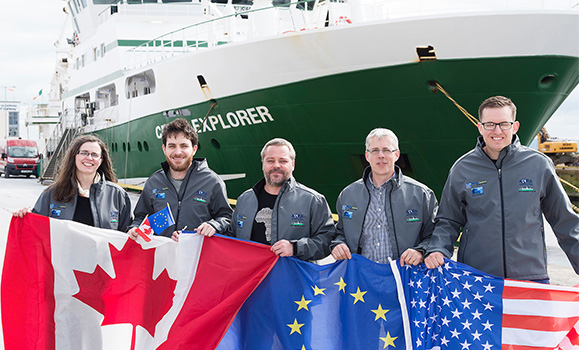Three made-in-Nova Scotia approaches to ocean science will be used during an upcoming voyage to study the impacts of climate change on the Northwest Atlantic, sailing from St. JohnŌĆÖs, NL to Galway, Ireland onboard the Irish research vessel the Celtic Explorer.
The research is being led by the Marine Institute of Galway, a partner of the ║┌┴Ž│į╣Ž═°-hosted Ocean Frontier Institute which was established in the fall of 2016 through a $220 million, multi-year program funded by the Government of Canada and various private and public sector organizations.
ŌĆ£OFI is an international hub for ocean science, bringing together researchers from both sides of the Atlantic to create safe, sustainable solutions for ocean development,ŌĆØ says Doug Wallace, Canada Excellence Research Chair in Ocean Science and Technology and an OFI researcher. ŌĆ£This research voyage illustrates the benefits of OFI, using made-in-Atlantic-Canada ingenuity to help assess climate change.ŌĆØ
The research vessel which departed Galway, Ireland on April 18, is scheduled to arrive in St. JohnŌĆÖs, Nfld. on April 26. The ship departs St. JohnŌĆÖs April 27, returning to Galway on May 23.

The scientific studies being conducted will help evaluate the impact of climate change on the ocean and identify how nutrients and oxygen move within the seaŌĆÖs currents. Data collected will also allow detection of the ongoing acidification of deep ocean waters, including those which impact the oceanŌĆÖs ecosystem.
The locally-developed equipment being used during the research voyage includes:
A mobile laboratory constructed by CTS Container Ltd. of Dartmouth, N.S.
The Celtic Explorer cruise marks the maiden voyage for this oceanography laboratory, a 20-foot long container designed to withstand the extremely rough weather and wave conditions of the Northwest Atlantic. The mobile lab will be attached to the Celtic ExplorerŌĆÖs electricity and water and its sturdy design mean scientists ŌĆö and their sensitive and valuable equipment ŌĆö are protected while working during inclement weather. The mobile lab allows research equipment to be more easily and efficiently transported to sea. Previously, the equipment would be dismantled, shipped in crates and then re-installed, increasing costs, set-up time and risk of equipment damage. This mobile laboratory creates new possibilities to use non-specialized vessels such as offshore supply vessels, for sophisticated chemical, biological and geological research at sea.
Carbon dioxide sensor made by Pro-Oceanus Systems Ltd. of Bridgewater, N.S.
The Northwest Atlantic Ocean removes vast amounts of carbon dioxide (CO2) from the atmosphere. While this ŌĆ£carbon sinkŌĆØ mitigates climate change, the CO2 offset must be measured to assess whether global efforts to reduce greenhouse gas emissions are effective. During the Celtic Explorer cruise, researchers will compare three different CO2 measurement systems including a high-accuracy sensor developed by Pro-Oceanus Systems Ltd. If the test on Celtic Explorer is successful, this made in Nova Scotia sensor can be installed on research and commercial vessels worldwide, increasing the data coverage from which to measure the oceanŌĆÖs carbon sink.
Identification system developed by the Bedford Institute of Oceanography, distributed by Cabot Shipping Supplies of Dartmouth
╠²
During the Celtic Explorer expedition, the vessel will stop every 30 nautical miles and sample water from at least 24 different depths. At each depth, samples for a dozen different measurements will be collected, resulting in thousands of individual water samples that must be recorded and tracked. A unique, sample-tracking system initially developed at Fisheries and Oceans CanadaŌĆÖs Bedford Institute of Oceanography, enables data collection to occur efficiently while the labelling ŌĆö known as ŌĆ£Bedford StickersŌĆØ ŌĆö creates a cohesive collection process. The ŌĆ£Bedford Stickers,ŌĆØ which use adhesive that withstand wet and dry conditions and variable temperatures, are distributed by Cabot Shipping Supplies of Dartmouth, NS.
The scientists conducting the research also have a Nova Scotia connection. Five of the researchers that will work onboard the Celtic Explorer are from Dalhousie:
- Claire Normandeau (CERC.Ocean lab manager; Dal group lead, St. JohnŌĆÖs to Galway)
- Ricardo Arruda (PhD student; round trip)
- Elizabeth Kerrigan (CERC.Ocean Research Assistant; St. JohnŌĆÖs to Galway)
- Lin Cheng (MSc student; St. JohnŌĆÖs to Galway)
- Lachlan Riehl (BSc Ocean Sciences student)
Watch:

